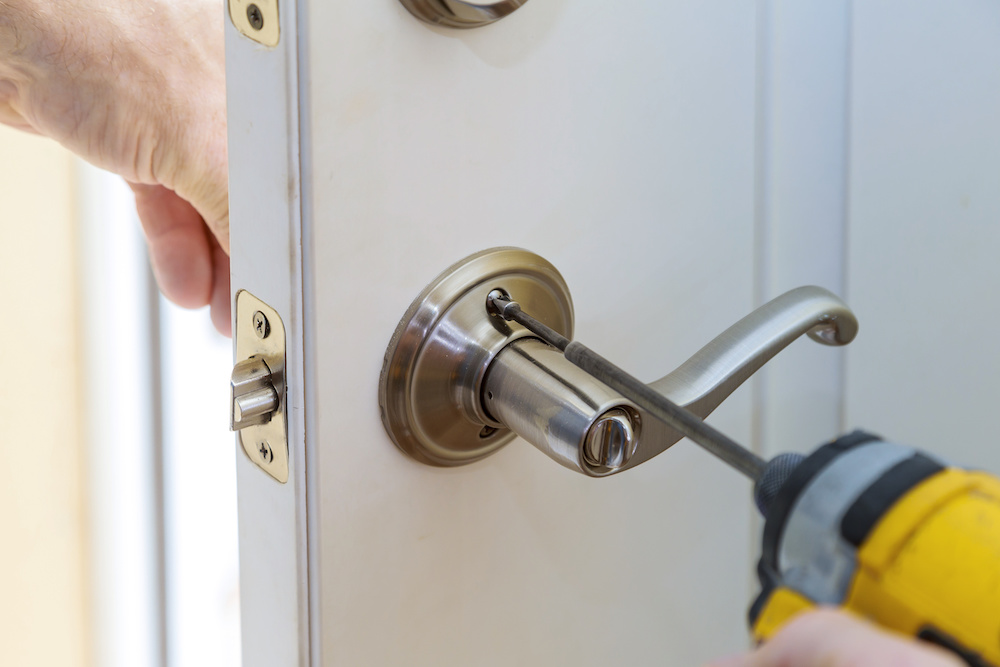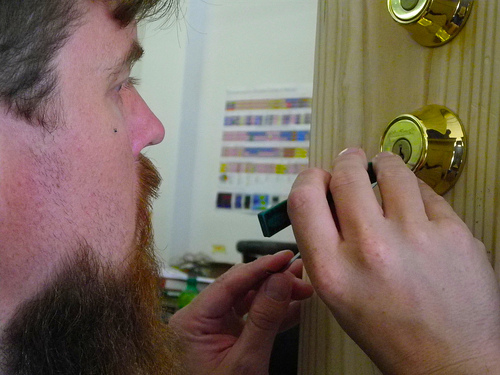Proof of identity is what separates a locksmith from someone assisting in breaking and entering. Some states, like California, require that locksmiths verify the identity of their clients before doing work, getting them to sign a work order form, and then keeping those work order forms for 2 years. I find this is good practice no matter what.
Just as it is important for us to always keep our customer in mind when working, it is as important to remember that our customer is the owner of the house. For that reason, we need to make sure we know who that is. I like to think people are good by default. But that doesn’t mean there aren’t ugly people out there. To make sure everything is safe, cover your bases.
Get Proof of Identity
Proof of identity is extremely important when doing work. Not only because there are people brazen enough to try to use a locksmith to unlock a home they intend to steal from, but because there are people that are asking you to do work that they aren’t legally allowed to request. Both of these can splash back on you, as the locksmith. But by going through the steps of attempting to verify their identity, and authorization to make the request, you cover yourself in case of a lawsuit.
“Show me a license”
This is probably the simplest method for obtaining an ID, and the one that will hold the most weight in court. You get them to show you a photo ID card, verify the address on the ID card is the same as the requested house, write down the ID number on your work order form, and have them sign it. If this ever ends up in court, you can honestly say that you verified they lived there, and asked all the right questions. At worst, you have locked down solid evidence for a lawsuit against the person in question, at best you’ve proven everything was kosher.
Sure, but what about car lock outs?
Obviously a car lockout is going to be more difficult. Getting an ID is still just as important, but you can’t directly tie that proof of identity to the car on your own. There are a couple ways to handle this.
Friends in Blue Places
The first way, and the one I suggest, is by making friends with your local police department. If you do that, they may be willing to help you out. Give them a call with the ID number, and the car’s license plate number, and see if the two match up. If you’re able to get these details over the phone, you can even save yourself a drive out there if the two don’t match up.
Unlock and Interrogate
The second method is my least favorite method, and that’s to open the door, get in, and find the registration yourself. If the registration doesn’t match up to the identification that you have, re-lock the door and take the keys with you. You will then need to track down the person who actually owns the car, or contact your friendly neighborhood police officer, just to cover your bases.
I don’t care for the second method because it puts you at risk of an unlawful entry suit. Granted, you’ll most likely get out of it if you handle yourself properly, but because there is such paranoia over what locksmiths are capable of, I am loath to suggest anything that even smells of illegal activity. The other reason I dislike it is because it is such a terrible customer service experience. You can mitigate this by being upfront with the person from the start, explaining that you will need the ID number of the person that the car is registered to, as well as a mailing address where you can mail them a copy of the signed work authorization form.
What? No ID?
You can go extremely safe, and only do work for people with an ID card on them. This is going to severely limit your work, though. How many people run out the house in their sweat pants, forget their house keys inside, but remember to grab their wallet? In these times you may need to get a little creative with how you verify identification.
Call the Landlord
One of the first things you should ask, even if the person has proof of identity, is whether or not they own the residence or are renting. If they are renting, you may want to take this step either way. It could be company policy to only do work authorized by the property owner. Or you might just suspect something is off with the customer. Either way, there are a few different reasons why someone with an address on their ID may not have the key to get into the residence, and most of them are bad reasons. Maybe they have been evicted, and want to get in to trash the place.
So call the landlord, verify the identity of the resident, get a mailing address, and send them the signed work authorization form.
Friendly Neighborhood…neighbor?
Neighbors are good for more than borrowing a cup of sugar, and yelling at about hedges. If their neighbor is able to verify their identity, that at least gives you corroboration.
Police…again
Seriously, whenever you’re doing something that brushes up against the legal grey area, and you want to cover yourself, call the police. Have someone come out to monitor the situation, and act as an impartial third party. Once inside, the customer will then need to get their ID and bring it out to both you and the police officer. This way they get back inside, you get your paperwork filed, and the police officer gets to hang out in a situation marginally less likely to get them shot. It’s a win for everybody, I think.
Get Signed Authorization and Liability Waiver
You probably noticed that a common theme above is the work order. That’s because it’s extremely important, both from a “getting paid” standpoint, as well as from a “covering your rear” standpoint. Aside from that, though, it allows you to focus on the customer. They understand exactly where you are coming from, as well as what you are going to do, and what you won’t do.
People expect there to be a bill, they want the receipt. They may even need the receipt, for one reason or another. Don’t feel like giving that to them is acting like you are suggesting they aren’t who they say they are.
And if you really need a way to make yourself feel better about getting proof of identity, just tell them your insurance requires it.
Keep Your Records Safe
If you’re going to get your clients to sign paperwork, it makes no sense to go back to the shop and stick it in the round filing cabinet. In California, in fact, you are required by law to maintain your work orders for a minimum of 2 years. This is plenty of time for any potential investigations to come around to pick them up.
Personally, I’m of the belief that you should maintain your hard copies for 2 years, but after that, you should maintain at least a digital copy for as long as you own your business. Storage is cheap, and the potential risk of lawsuits, or repeat terrible clients, is high. We’ll go deeper into horror clients in a later post, but for now suffice to say that if you can find a way to track your bad clients, you’ll be able to weed them out before you get to their door.
So what do you think? Have you come up with any other ways to verify your potential clients identity? Comments or opinions on the ones provided? Leave a comment on this post, and let’s get talking!




[…] the oven. Now, she calls you, and you head on over her way. She happens to have her ID on hand, so proof of identity isn’t an issue, so you get her to sign the paperwork, and get right to work. Karen is an […]